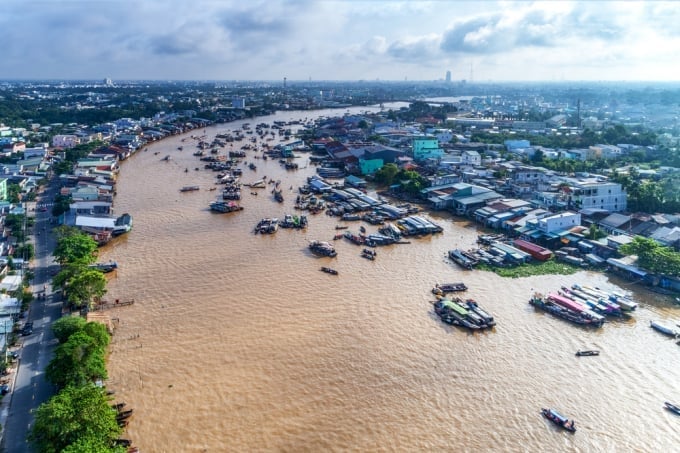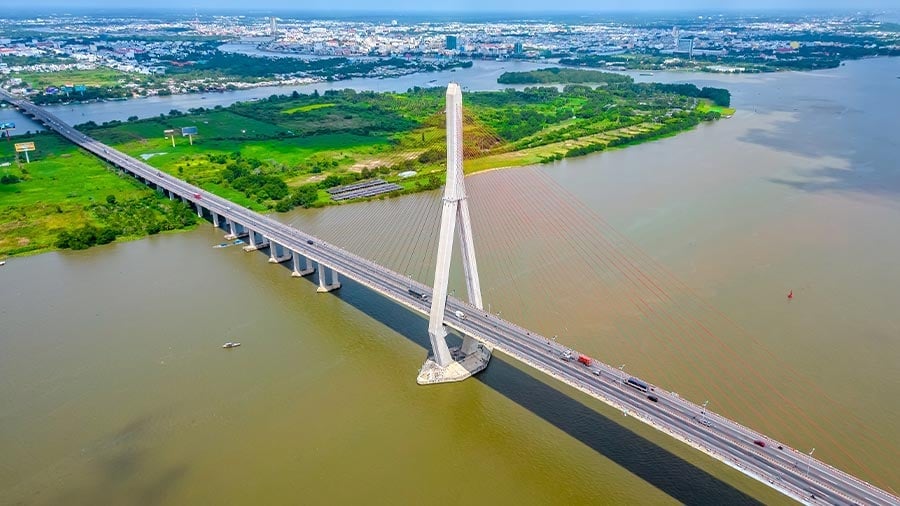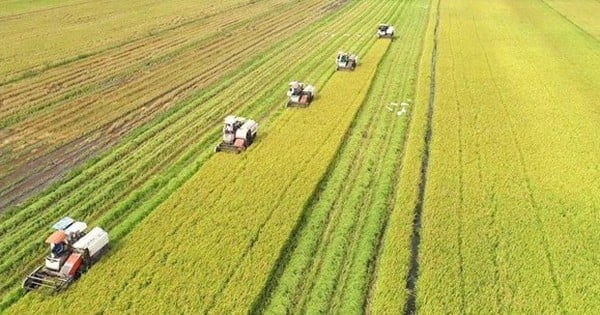October 30, 2025 | 09:47 GMT +7
October 30, 2025 | 09:47 GMT +7
Hotline: 0913.378.918
October 30, 2025 | 09:47 GMT +7
Hotline: 0913.378.918
The Mekong Delta, a vast delta region covering roughly 40,000 km² and home to 17.4 million people across 13 provinces and cities, has undergone a remarkable transformation. From a land once described as where “even a bird call carried fear, and a fish stir caused chills,” it has risen to become a national hub for the production and export of food, seafood, and fruit.

The Mekong Delta is a national hub for the production and export of food, seafood, and fruit. Photo: TL.
In 2024, the total export turnover of the Mekong Delta region reached approximately USD 25.7 billion, representing a 16% increase compared to the same period last year. Despite this success, the region continues to face structural limitations, including small-scale production, fragmented resources, asynchronous infrastructure, and weak regional linkages. These constraints have diminished its competitiveness and its responses to pressing challenges, such as climate change and saltwater intrusion.
The Government's policy to merge provincial-level administrative units is seen as a strategic direction to address these issues. As Vietnam's key agricultural region, the merger of provinces and cities in the Mekong Delta is not merely a matter of changing land boundaries, but it also opens up major opportunities for the region to reshape its agricultural development strategy toward large-scale production, effective regional linkage, and sustainability.
According to Assoc. Prof. Dr. Pham Le Thong, Head of the Agricultural Economics Department (School of Economics – Can Tho University), merging provinces will enlarge the scale of the provinces. This creates favorable conditions for provinces to plan specialized production zones on a large and synchronous scale.
Sharing about new favorable conditions for the Mekong Delta region’s agriculture following the merger of provinces and cities in the region, Dr. Tran Huu Hiep, Economic Expert of the Mekong Delta region, emphasized that the merger opens up new expectations and opportunities for regional and local development space.
“Merging provinces can unlock new models of cooperation and linkage in agricultural investment and development, focusing on sustainable agriculture with key products,” Dr. Tran Huu Hiep said.

Can Tho will open up a new pathway for maritime development after integration with Hau Giang and Soc Trang. Photo: TL.
He also highlighted that aligning development strategies with local strengths and leveraging marine economic potential will unlock new growth areas. For example, Can Tho, which was once the regional hub, will open up a new pathway for maritime development after integration with Hau Giang and Soc Trang. Similarly, An Giang and Kien Giang provinces will also coordinate to form a new An Giang province, with a development orientation toward the Western Sea.
This reorganization is expected to breathe new life into regional planning, enabling each locality to better utilize its natural advantages within a broader and more coordinated framework.
As Assoc. Prof. Dr. Pham Le Thong mentioned that an enlarged scale will pave the way for planning larger and more synchronous production zones. “Merging provinces allows for long-term planning on a bigger scale, which is key to developing infrastructure, logistics, and the application of high-tech and circular agriculture,” he explained.

The merger of Mekong Delta provinces and cities will contribute to planning large-scale agricultural production areas. Photo: VAN.
This shift, Dr. Pham Le Thong added, also reduces administrative barriers and creates a more attractive environment for investors. As provincial markets and production capacities expand, costs decrease and efficiency improves, benefiting both businesses and consumers.
Moreover, provincial mergers are expected to facilitate better management of natural resources, agricultural resources, land, and especially water resources. As a result, agricultural production activities across the region can become more synchronous and effective.
Another key advantage of the mergers lies in infrastructure development, especially irrigation works. According to Dr. Tran Huu Hiep, the decentralization and fragmentation of administrative boundaries between provinces in the past led to disconnected investments. “For example, an irrigation work might be built by one province, even though it should have been connected with neighboring provinces,” he explained.
Now, with a broader development space, the implementation of investment projects in irrigation and raw material areas can be more widely connected across localities.
Importantly, this new development framework also allows for the creation of fully integrated value chains. From input supply and raw material areas to production, processing, and distribution, agricultural activities can now be synchronized across provinces. This facilitates better coordination between production zones and logistics systems, including agro-product processing hubs and consumption markets.
The restructuring of provincial boundaries in the Mekong Delta is more than an administrative adjustment. The provincial merger will create a premise for the Mekong Delta to maximize its potential, optimize resources, facilitate infrastructure investment, and strengthen regional linkages.
Translated by Thu Huyen

(VAN) Experts propose translating evidence and practical models into concrete policies and resources, establishing agroecology as the foundation for a sustainable agricultural transition.

(VAN) Viet Nam’s rice exports struggle after the Philippines halted imports. Beyond the efforts of businesses, government contracts play a key role.

(VAN) An Giang Province calls on the people to combat IUU fishing; violations may result in a VND 1 billion fine or imprisonment of 15 years.

(VAN) Sludge treatment has been a major challenge for Hanoi, which may seem minor at first glance but has a profound impact on sustainable development.
/2025/10/24/1814-3-091309_468.jpg)
(VAN) With an estimated value of around $10 trillion by 2028, Halal is becoming a promising new market for Vietnam's agricultural and food exports.

(VAN) The Ministry of Agriculture and Environment has issued Decision No. 4082/QD-BNNMT on the Ministry’s plan to implement the Prime Minister’s Decision No. 1422/QD-TTg dated November 19, 2024.

(VAN) The Prime Minister has requested the Ministry of Agriculture and Environment to coordinate with the Government Office in compiling weekly reports on the results of combating IUU fishing by ministries, sectors, and localities.